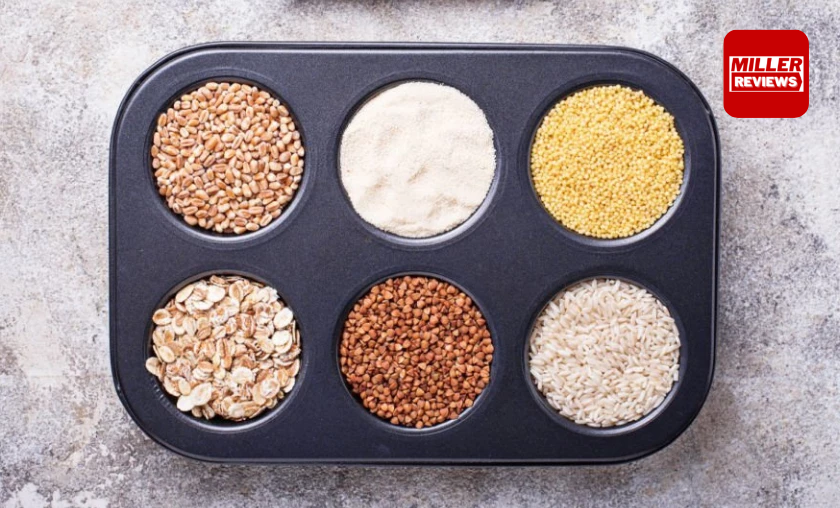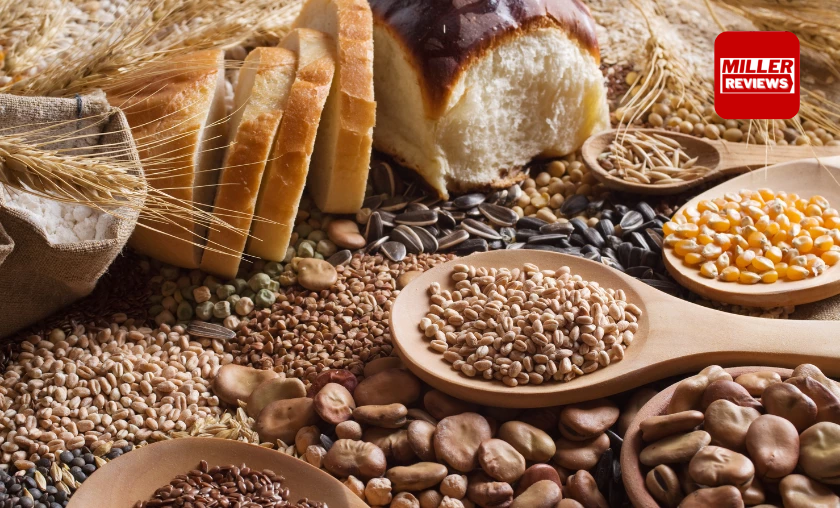Is Going Grain-Free Better for Your Health?: Every few years, the new food group is labeled
as “bad for you,” leading to a surge in fad diets and cherry-picked scientific data. G grains have been under intense media scrutiny lately, associated with weight gain, digestive issues, and brain fog.
Let’s acknowledge the seriousness of gluten intolerance. Consuming gluten can cause more than 200 symptoms in individuals with celiac disease, from anemia to severe stomach pain. Even those with gluten sensitivity may experience delayed symptoms, ranging from bloating to fatigue.
Setting gluten aside, grains and grain-based products like pasta and bread are major sources of carbohydrates in the American diet, often with too many refined options. Even traditionally praised whole grains have faced criticism. Diets like keto, paleo, and Whole30 advocate avoiding grains entirely. Are grains really as bad as they’re portrayed? This article explores the ins & outs of a grain-free diet and its potential impact on your health.
Table of Contents
What Is a Grain-Free Diet?

When you opt for a grain-free diet, you’re essentially cutting out all grains from your plate, and that includes wholesome varieties like bulgur, farro, millet, rice, spelled, quinoa, and wheat. Products derived from grains like breads, cereals, crackers, pasta, and certain plant-based milks are also off-limits. Some grain-free diets even suggest avoiding corn and corn-based products. It’s important to note that going grain-free is a more restrictive choice compared to going gluten-free.
Now, what’s left for you to enjoy on a grain-free diet? Well, fear not! There are still plenty of options available. You can savor vegetables, beans, legumes, seeds, nuts, dairy, meat, poultry, fish, soy, and fruit while adhering to a grain-free lifestyle.
What Are the Benefits of Eating a Grain-Free Diet?

Eliminating grains brings immediate benefits, including the inclusion of healthier foods and grain-free alternatives. For instance, replacing grain-based pasta with spiralized zucchini and avocado oil dressing. You can enjoy a wider variety of nutritious options by reducing processed food intake. A healthier diet involves a good balance of whole fruits, vegetables, beans, seeds, nuts, and optional meat or fish.
A gluten-free diet can benefit those with gluten sensitivity or celiac disease by promoting weight loss, reducing inflammation, improving digestion, and enhancing insulin resistance and blood sugar levels. However, the effects of a grain-free diet on individuals without gluten sensitivity remain uncertain.
A 2018 article in Gastroenterology & Hepatology discussed the positives and negatives of gluten avoidance, including the perception of gluten as potentially harmful. While avoiding gluten may benefit those with gastrointestinal symptoms like irritable bowel syndrome, limited evidence supports gluten avoidance for other physical symptoms or conditions unrelated to immune responses to gluten. It’s important to consider that gluten avoidance could have adverse effects on individuals without gluten-related diseases.
- Gluten avoidance may benefit individuals with gastrointestinal symptoms like irritable bowel syndrome.
- Limited evidence supports gluten avoidance for physical symptoms or conditions unrelated to immune responses to gluten.
- Gluten avoidance could have adverse effects on individuals without gluten-related diseases.
A gluten-free or grain-free diet can reduce inflammation, aid weight loss, & improve digestion and blood sugar levels for those with gluten sensitivity or allergy.
Who Might Benefit From a Grain-Free Diet?

According to a 2018 study in Gastroenterology & Hepatology, individuals with digestive disorders may benefit from a grain-free diet. Certain grains, particularly those containing FODMAPS, can cause bloating and gas. However, small portions of grains might still be tolerated.
For those with autoimmune conditions like fibromyalgia, lupus, rheumatoid arthritis, or Grave’s Disease, a grain-free diet could potentially alleviate inflammation-related symptoms.
A 2020 review in Nutrition Reviews highlighted the influence of different compounds in whole grains on digestion and inflammation. It emphasized the role of gut microbiota in transforming these compounds into beneficial metabolites that moderate inflammatory signaling pathways.
Whole grains have been associated with reduced risk of weight gain and obesity, stroke, hypertension, cardiovascular disease, cancers of the upper gut, and overall mortality, according to a 2010 review in Food Science and Technology.
The 2005 United States Dietary Guidelines Advisory Committee recommended consuming half of the grain intake as whole grains, a recommendation upheld by the most recent dietary guidelines released in December 2020. This translates to about three to five servings of whole grains daily.
Can You Lose Weight on a Grain-Free Diet?

A grain-free diet can aid weight loss by eliminating calorie-dense, nutrition-poor refined grains like white bread, pasta, and fast food.
However, relying solely on processed grain-free alternatives may provide a different variety of nutrients than a diet rich in whole foods. Many plant-based substitutes in the frozen aisle can be high in sodium and may contain fillers and questionable ingredients.
According to Dr. Shireen Kassam, an expert at King’s College Hospital, studies suggest that an unhealthy plant-based diet is equally detrimental to health as a typical Western diet high in animal-derived foods and saturated fat.
You may regain weight loss if you reintroduce grains without moderation, even with a balanced diet, including fruits and vegetables. In fact, regularly consuming whole grains can help maintain a healthy weight, as stated in a 2021 article in the Chinese Journal of Preventive Medicine.
What Are the Side Effects of Giving up Grains?

Eliminating grains from your diet can limit nutrient intake and increase the risk of constipation due to reduced fiber. It’s important to find alternative sources of fiber, such as edible fruit peels or vegetable skins. Additionally, avoiding whole grains may raise the risk of heart disease and inflammation in the gut, as they provide essential nutrients and influence gut health.
While the “paleo diet” has shown some potential in reducing blood glucose and heart disease risk factors, it has also faced criticism for its high saturated fat content and lack of certain nutrients like vitamin D and calcium. Eliminating grains may pose a greater risk if you have a history of nutritional deficiencies.
Grains Aren’t All Bad

Eliminating grains for unsubstantiated health reasons may promote orthorexic eating behaviors. While some individuals may benefit from reducing or eliminating grains, it is important to note that completely cutting out grains, especially whole grains, is unhealthy for those without specific medical concerns.
Spreading health misinformation and myths can hinder those who genuinely need to reduce or eliminate grains. Be cautious of grain-free products, as they often contain added sugar, sodium, and fillers, especially when intended as substitutes for processed convenience foods. Carefully read ingredient labels and seek guidance from a registered dietitian before making significant dietary changes.
Tiffany Chaney, a dedicated environmental and wellness writer, advocates for ethics and transparency in her work. She holds a BA in creative writing & has expertise in Western herbalism and Traditional Chinese Medicine. Additionally, Tiffany is an accomplished creative writer and artist.
Conclusion
The question of whether going grain-free is better for your health requires careful consideration and an understanding of individual needs. While eliminating grains can offer benefits for those with specific medical conditions or sensitivities, it is not a one-size-fits-all approach. Whole grains provide essential nutrients and can contribute to a healthy diet for most individuals.
Relying on accurate information, consulting with professionals, and maintaining a balanced approach to nutrition are key to making informed decisions about your health. Remember, there is no universal answer when it comes to dietary choices, so it’s essential to prioritize your unique well-being above all else.
FAQs
Is a grain-free diet suitable for everyone?
While a grain-free diet may have its benefits, it is important to note that it may not be necessary or beneficial for everyone.
Each person’s dietary needs and health conditions vary, so consulting with a healthcare professional or registered dietitian is recommended to determine if a grain-free approach is suitable for you.
Can going grain-free help with weight loss?
Eliminating grains, particularly refined grains, from your diet can contribute to weight loss due to their high-calorie content.
However, focusing on overall balanced nutrition and portion control is important rather than solely relying on grain elimination for weight management.
Are there any potential drawbacks to a grain-free diet?
Going grain-free can lead to nutritional deficiencies if not carefully planned. Whole grains are a good source of essential nutrients such as B vitamins, minerals, and dietary fiber.
To compensate for the absence of grains, it’s crucial to ensure a diverse intake of other nutrient-rich foods to maintain a well-rounded diet.
What about the impact of a grain-free diet on gut health?
Whole grains can contribute to a healthy gut microbiome due to their fiber content, which promotes digestive health.
While eliminating grains may alleviate symptoms for some individuals with specific gastrointestinal conditions, it’s important to consider alternative fiber sources to support gut health when following a grain-free diet.
How can I make informed choices about grain consumption?
Rather than adopting a strict grain-free diet, a balanced approach that includes whole grains can provide various health benefits. Opting for whole-grain options like quinoa, brown rice, or whole wheat can offer valuable nutrients and fiber.
Moderation, mindful choices, and consulting a healthcare professional can help you make informed decisions about grain consumption based on your unique health needs.
For More amazing articles related to Health Check out our website Over Here
To Read more similar articles click here
Thanks for visiting our Website. If you appreciate our work, kindly show us some support in our comments section 🙂